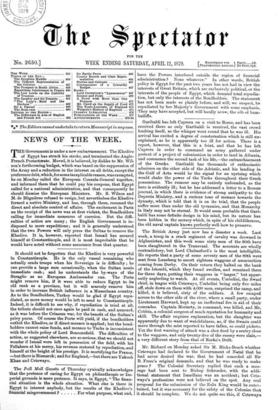The British Army just now has a disaster a week.
Last week, a troop in a crack regiment of cavalry was drowned in Afghanistan, and this week some sixty men of the 80th have been slaughtered in the Transvaal. The accounts are wholly contradictory, but Lord Chelmsford's is the most intelligible. He reports that a party of some seventy men of the 80th were sent from Luneberg to escort eighteen waggons of ammunition coming from Derby. On their return they halted on the bank of the Istombi, which they found swollen, and remained. there for three days, patting their waggons in " laager," but appar- ently neglecting to watch. At all events, Umbelini, the Swazi chief, in league with Cetewayo, 17mbelini being only five miles off, stole down on them with 4,000 men, surprised the camp, and killed, it is believed, sixty of the soldiers. A few escaped across to the other side of the river, where a small party, under Lieutenant Harward, kept up an ineffectual fire in aid of their comrades. Captain Moriarty, in command, was killed, and Mr. Cobbin, a colonial surgeon of much reputation for humanity and. skill. The affair requires explanation, but the slaughter was apparently due to want of watchfulness, as, if the Swazis could move through the mist reported to have fallen, so could pickets. Yet the first warning of attack was a shot fired by a sentry close to the waggons, and only twenty-five of the enemy were slain,— a very different story from that of Rorke's Drift.


































